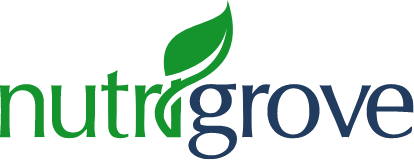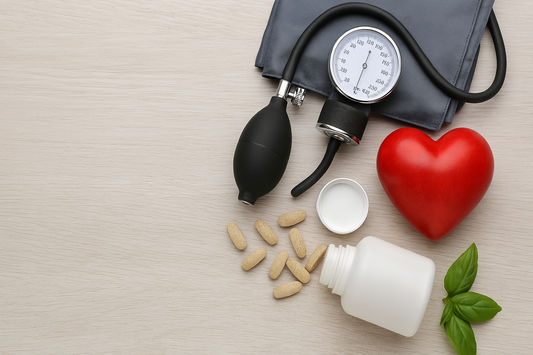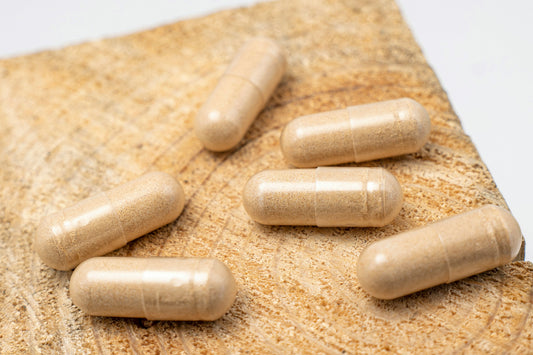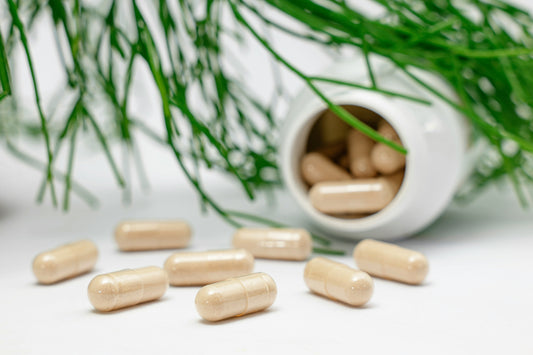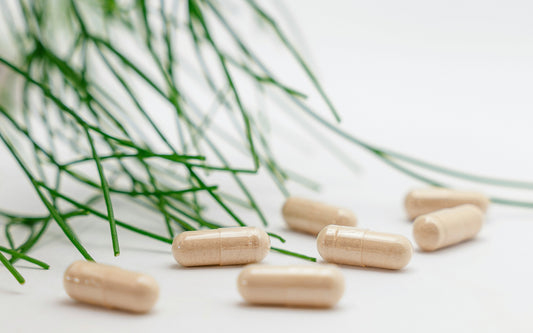14 Effective Ways to Lower Your Blood Pressure
Maintaining healthy blood pressure levels is essential for overall well-being. In this article, we will explore 14 effective ways to lower your blood pressure naturally and improve your cardiovascular health.
Key Takeaways:
- Engage in regular aerobic and resistance exercise to strengthen your heart and lower blood pressure.
- Losing weight, especially for those who are overweight, can reduce the strain on the heart and lower blood pressure.
- Limiting sugar and refined carbs can aid in weight loss and lower blood pressure.
- Consuming more potassium-rich foods and reducing salt intake can help lower blood pressure.
- The DASH diet, which emphasizes fruits, vegetables, whole grains, low-fat dairy, and lean proteins, can lower blood pressure.
Get enough exercise
Engaging in regular exercise is crucial for lowering blood pressure and improving cardiovascular health. Aerobic exercises like walking, jogging, or cycling can help strengthen your heart and improve blood flow, thereby reducing the strain on your arteries and lowering blood pressure levels.
If you're new to exercise or have any underlying health conditions, it's important to consult with your healthcare provider before starting a new exercise program. They can provide personalized recommendations and ensure that you're exercising safely and effectively.
Remember, consistency is key when it comes to exercise. Aim for at least 150 minutes of moderate-intensity exercise or 75 minutes of vigorous-intensity exercise each week. You can break it down into smaller sessions throughout the day if needed.
Manage Weight for Healthy Blood Pressure
Maintaining a healthy weight can significantly contribute to lowering blood pressure and promoting heart health. Excess weight puts strain on the heart and blood vessels, leading to an increased risk of high blood pressure. By managing weight effectively, individuals can improve their overall cardiovascular well-being and reduce the likelihood of developing hypertension.
Adopting Healthy Lifestyle Changes
To manage weight and lower blood pressure, it is important to adopt a combination of healthy lifestyle changes. This includes incorporating regular physical exercise into daily routines, such as engaging in aerobic activities like walking, running, or cycling. Additionally, strength training exercises can help build muscle mass and improve overall body composition.
Furthermore, making dietary modifications is essential for weight management. Prioritize consuming nutrient-dense foods, such as fruits, vegetables, whole grains, and lean proteins, while limiting the intake of sugary snacks and refined carbohydrates. These dietary changes can aid in weight loss and decrease the risk of high blood pressure.
Finding Support and Establishing Habits
Building a support system and establishing healthy habits are integral to successfully managing weight. Surrounding oneself with like-minded individuals who prioritize a healthy lifestyle can provide motivation and accountability. Additionally, developing effective strategies for stress management, such as practicing mindfulness or seeking therapy, can help prevent emotional eating and support weight management efforts.
In conclusion, maintaining a healthy weight is crucial for promoting heart health and reducing the risk of high blood pressure. Through regular exercise, dietary modifications, and the support of a healthy lifestyle, individuals can establish sustainable habits that contribute to long-term weight management and optimal cardiovascular well-being.
Cut back on sugar and refined carbohydrates
Limiting consumption of sugar and refined carbs can play a crucial role in lowering blood pressure and improving overall health. These types of foods can cause spikes in blood sugar levels and contribute to weight gain, both of which can increase the risk of high blood pressure. To lower your blood pressure, consider reducing your intake of sugary drinks, desserts, processed snacks, and foods made with white flour.
Instead, opt for whole, unprocessed foods that are rich in nutrients. Choose complex carbohydrates like whole grains, fruits, and vegetables, which provide fiber and antioxidants that can support heart health. These foods can help regulate blood sugar levels, promote satiety, and aid in weight management.
It's also important to read food labels carefully and be aware of hidden sources of added sugars, such as sauces, dressings, and condiments. By making these dietary changes, you can take a significant step towards maintaining healthy blood pressure levels and improving your overall well-being.

Increase Potassium and Decrease Salt Intake
Consuming foods high in potassium and reducing salt intake can effectively lower blood pressure and reduce the risk of hypertension. Potassium is a mineral that helps regulate blood pressure by counteracting the effects of sodium. Foods rich in potassium include bananas, avocados, spinach, and sweet potatoes. Incorporating these into your diet can help maintain a healthy blood pressure level.
On the other hand, reducing salt intake is equally important for blood pressure management. High sodium consumption can lead to fluid retention, increasing blood volume and raising blood pressure. To lower your sodium intake, avoid processed and packaged foods, as they tend to be high in salt. Instead, opt for fresh, whole foods and season with herbs and spices to enhance flavor without the added sodium.
Try These Tips:
To increase your potassium intake, include a variety of potassium-rich foods in your meals and snacks. Experiment with recipes that incorporate ingredients like bananas, avocados, and leafy greens. Consider substituting salt with herbs, spices, or low-sodium seasonings to reduce your sodium intake without compromising flavor. By making these dietary adjustments, you can take proactive steps towards lowering your blood pressure naturally.
Follow a heart-healthy diet
The Dietary Approaches to Stop Hypertension (DASH) diet is a proven method to lower blood pressure by incorporating heart-healthy foods. This eating plan emphasizes the consumption of fruits, vegetables, whole grains, lean proteins, and low-fat dairy products while limiting saturated and trans fats.
Incorporate fruits and vegetables
Fruits and vegetables are rich in vitamins, minerals, and fiber, which can help lower blood pressure. Aim to include a variety of colorful produce in your meals, such as berries, leafy greens, citrus fruits, and cruciferous vegetables.
Choose whole grains
Whole grains like brown rice, quinoa, and whole wheat bread provide more nutrients and fiber compared to refined grains. These fiber-rich foods can aid in weight management and contribute to lower blood pressure.
Opt for lean proteins
Include lean protein sources such as skinless poultry, fish, legumes, and tofu in your diet. These protein options are lower in saturated fat and can help maintain healthy blood pressure levels.
Limit sodium intake
Sodium can contribute to high blood pressure, so it's important to limit your intake. Avoid adding extra salt to your meals and opt for low-sodium alternatives. Be mindful of processed foods, as they often contain high levels of sodium. Cooking at home using fresh ingredients can help you better control your sodium intake.
By following a heart-healthy diet like DASH, you can make significant strides in lowering your blood pressure and improving your overall cardiovascular health. Pair this dietary approach with regular exercise, stress management, and other lifestyle modifications to achieve optimal results.
Limit processed food
Cutting down on processed foods can be instrumental in lowering blood pressure and improving overall cardiovascular health. Processed foods are often packed with high amounts of salt, sugar, unhealthy fats, and preservatives, all of which can contribute to hypertension. By reducing your intake of processed foods, you can lower your salt and sugar consumption, which are major culprits behind elevated blood pressure levels.
Instead of relying on processed snacks and meals, opt for whole, unprocessed foods. Increase your intake of fresh fruits and vegetables, whole grains, lean proteins, and healthy fats. These nutrient-rich foods provide essential vitamins, minerals, and antioxidants that support heart health and help regulate blood pressure.
By making simple changes to your diet and opting for whole, unprocessed foods, you can take a proactive approach to managing your blood pressure naturally.
Quit or Avoid Smoking
Quitting smoking or avoiding it altogether is vital for reducing blood pressure and minimizing the risk of hypertension. Smoking has been shown to have a direct impact on blood pressure, causing it to rise and increasing the strain on the cardiovascular system. By quitting smoking, you can significantly improve your overall health and lower your blood pressure levels.
The Detrimental Effects of Smoking on Blood Pressure
When you smoke, the chemicals in tobacco can damage your blood vessels and reduce the amount of oxygen that reaches your organs, including your heart. This leads to an increase in blood pressure, as the heart has to work harder to pump blood throughout the body. Additionally, smoking can promote the formation of blood clots, further narrowing the arteries and raising blood pressure.
By quitting smoking, you can reverse some of the damage caused by tobacco and reduce your risk of developing hypertension. Not only will quitting smoking benefit your blood pressure, but it will also improve the health of your lungs and reduce the risk of other cardiovascular diseases.
If you are struggling to quit smoking, there are various resources available to help you on your journey. Speak to your healthcare provider who can provide guidance and support, and consider joining a smoking cessation program or support group. Remember, quitting smoking is one of the most impactful lifestyle changes you can make to lower your blood pressure and improve your overall health.
Manage Stress
Finding effective ways to manage stress can significantly contribute to controlling blood pressure levels and promoting overall well-being. Chronic stress can lead to elevated blood pressure, so incorporating stress reduction techniques into your daily routine is crucial for hypertension prevention.
Practice Relaxation Techniques
Engaging in relaxation techniques, such as deep breathing exercises, progressive muscle relaxation, or meditation, can help lower stress hormones and promote a sense of calm. Take a few moments each day to prioritize relaxation and allow your mind and body to unwind.
Stay Active
Physical activity is not only beneficial for your cardiovascular health but also serves as a great stress reliever. Engage in activities you enjoy, such as walking, swimming, or yoga, to release tension and improve your overall mood.
Additionally, maintaining a balanced lifestyle, getting enough sleep, and fostering supportive relationships can further aid in stress management and contribute to healthy blood pressure levels.
Eat some dark chocolate
Indulging in a moderate amount of dark chocolate with high cacao content can have a positive impact on blood pressure levels. Dark chocolate contains flavanols, which are plant compounds that have been shown to promote the dilation of blood vessels and improve blood flow. This increased blood flow can help reduce blood pressure readings and improve overall cardiovascular health.
When choosing dark chocolate, opt for varieties that have a high percentage of cacao, preferably above 70%. This ensures a higher concentration of flavanols and fewer added sugars. Remember to enjoy dark chocolate in moderation, as it still contains calories and should be consumed as part of a balanced diet.
Other natural remedies for hypertension
In addition to dark chocolate, there are other natural remedies that may help lower blood pressure. For example, garlic has been traditionally used for its potential cardiovascular benefits. It may help relax and widen blood vessels, leading to lower blood pressure. Garlic and hawthorn are herbs that have also been suggested to have blood pressure-lowering effects, although further research is needed to fully understand their efficacy.
A good a daily all natural supplement for hypertension.
It's important to note that while these natural remedies show promise, they should not replace prescribed medications or medical advice. If you have high blood pressure, it is crucial to work closely with your healthcare provider to develop a comprehensive treatment plan that suits your individual needs.
Try Medicinal Herbs
Some medicinal herbs, such as garlic, ginger, and hawthorn, have shown promise in potentially lowering blood pressure, although further research is needed. Garlic, known for its distinct aroma and flavor, has been found to modestly reduce blood pressure. It is believed that garlic contains compounds that promote blood vessel dilation and reduce inflammation, contributing to lower blood pressure levels. Incorporating garlic into your diet or taking garlic extract supplements may be worth considering for blood pressure management.
Ginger, often used for its culinary and medicinal properties, has also demonstrated potential in lowering blood pressure. Studies suggest that ginger may act as a vasodilator, helping to widen blood vessels and improve blood flow, thus reducing blood pressure levels. Adding ginger to your meals or consuming ginger tea could be a natural way to support healthy blood pressure.
Hawthorn, a flowering shrub native to Europe, has a long history of traditional use in cardiovascular health. Research suggests that hawthorn may have positive effects on blood pressure by dilating blood vessels and improving blood flow. While hawthorn supplements are available, it is important to consult with a healthcare professional or herbalist before incorporating them into your routine.
Get quality sleep
Prioritizing quality sleep is crucial for effectively managing blood pressure and promoting overall cardiovascular health. When you don't get enough sleep, your body may produce more stress hormones, which can increase blood pressure levels. Additionally, inadequate sleep can disrupt your body's natural rhythms and lead to imbalances in hormones that regulate blood pressure.
To optimize your sleep quality, establish a consistent sleep schedule and create a relaxing bedtime routine. Make your sleep environment comfortable, cool, and dark. Avoid stimulating activities, such as using electronic devices or consuming caffeine, close to bedtime. Engage in relaxation techniques, such as deep breathing or meditation, to calm your mind and prepare your body for restful sleep.
If you struggle with sleep issues, consider discussing them with a healthcare professional. They can help identify underlying causes and provide guidance on possible treatments or lifestyle modifications to improve your sleep quality and, in turn, manage your blood pressure effectively.
Eat garlic or take garlic extract supplements
Garlic has been found to have modest blood pressure-lowering effects, making it a beneficial addition to a heart-healthy diet. This natural remedy for hypertension has been used for centuries in traditional medicine and has gained attention for its potential cardiovascular benefits. The active ingredient in garlic, known as allicin, is believed to contribute to its blood pressure-lowering properties.
Studies have shown that consuming garlic or taking garlic extract supplements may lead to a slight decrease in both systolic and diastolic blood pressure. While the exact mechanism by which garlic works to lower blood pressure is not fully understood, it is thought to involve its ability to relax blood vessels and improve blood flow.
It's important to note that while garlic may offer some benefits for blood pressure management, it should not replace prescribed medications or medical advice. As with any natural remedy or supplement, it's always best to consult with a healthcare professional before incorporating garlic into your routine, especially if you are taking any medications or have underlying health conditions.
Eat healthy high-protein foods
Consuming a diet rich in healthy high-protein foods, especially when combined with high fiber intake, may help reduce the risk of high blood pressure. Protein is an essential macronutrient that plays a crucial role in maintaining overall health, including blood pressure regulation. Incorporating lean sources of protein such as poultry, fish, legumes, and tofu into your meals can provide you with the necessary amino acids while keeping saturated fats in check.
In addition to protein, fiber-rich foods like whole grains, fruits, and vegetables offer numerous benefits for blood pressure management. High-fiber diets have been linked to lower blood pressure levels due to their ability to reduce systemic inflammation, regulate cholesterol levels, and improve gut health. By choosing whole, unprocessed foods, you not only increase your protein and fiber intake but also reduce your consumption of added sugars, sodium, and unhealthy fats, which can all contribute to elevated blood pressure.
If you're looking to add more high-protein foods to your diet, consider incorporating options like Greek yogurt, cottage cheese, eggs, and nuts. These foods not only provide a good amount of protein but also offer other important nutrients like calcium, magnesium, and potassium, which are crucial for maintaining healthy blood pressure levels. Remember to prioritize variety and balance in your diet, as consuming a wide range of nutrient-dense foods is key to overall cardiovascular health.
The role of protein in blood pressure management
Protein-rich foods have been shown to have beneficial effects on blood pressure. One study published in the American Journal of Clinical Nutrition found that individuals who consumed higher amounts of protein, particularly plant-based protein, had lower systolic and diastolic blood pressure compared to those with lower protein intake. Another study published in Hypertension highlighted the role of a high-protein diet, specifically one that includes dairy products, in reducing the risk of hypertension.
However, it's important to note that while a diet rich in healthy high-protein foods can contribute to blood pressure management, it should be part of an overall balanced lifestyle that includes regular exercise, stress management, and other healthy habits. Consulting with a healthcare professional or registered dietitian can provide personalized guidance and help tailor a dietary plan that suits your individual needs and goals.
Take Supplements
Some supplements, when used under medical supervision, may assist in managing blood pressure levels and promoting heart health. Omega-3 fatty acids, found in fish oil supplements, have been shown to have a modest effect on reducing blood pressure. Whey protein supplements, often used by athletes, may also contribute to blood pressure control. Additionally, magnesium and potassium supplements have been found to have potential benefits in managing blood pressure.
It is important to note that supplements should be taken in consultation with a healthcare professional, as they may interact with other medications or have side effects. Your doctor can help determine if supplementing with omega-3 fatty acids, whey protein, magnesium, or potassium is appropriate for your individual situation.
While supplements may have some benefits, they should not be seen as a sole solution for managing blood pressure. Adopting a holistic approach, including lifestyle changes such as regular exercise, a healthy diet, stress management, and adequate sleep, is crucial for long-term blood pressure control. Always consult with your healthcare provider to develop a personalized plan that addresses your specific needs and goals.
Conclusion
By incorporating these 14 effective ways to lower your blood pressure into your lifestyle, you can take proactive steps towards reducing hypertension risks and maintaining overall well-being.
Engaging in regular exercise, managing your weight, and cutting back on sugar and refined carbohydrates are crucial lifestyle changes to lower your blood pressure. Additionally, increasing potassium intake while decreasing salt consumption can have a positive impact on your cardiovascular health.
Following a heart-healthy diet, limiting processed food, and quitting smoking are further strategies for maintaining healthy blood pressure levels. Managing stress, getting quality sleep, and incorporating garlic or garlic extract supplements into your diet can also contribute to blood pressure control. Additionally, considering the potential benefits of dark chocolate, medicinal herbs, healthy high-protein foods, and certain supplements, under the guidance of a healthcare professional, may further support your efforts in managing hypertension.
Remember, maintaining healthy blood pressure is a holistic approach that requires dedication and consistency. By adopting these lifestyle changes and incorporating these tips, you can take charge of your cardiovascular health and reduce the risks associated with hypertension.
FAQ
What are some effective ways to lower blood pressure?
Engaging in regular exercise, managing weight, cutting back on sugar and refined carbohydrates, increasing potassium intake while decreasing salt intake, following a heart-healthy diet, limiting processed food, quitting or avoiding smoking, managing stress, eating some dark chocolate, trying medicinal herbs, getting quality sleep, eating garlic or taking garlic extract supplements, consuming healthy high-protein foods, and considering certain supplements like omega-3 fatty acids, whey protein, magnesium, and potassium can help lower blood pressure.
Why is exercise important for maintaining healthy blood pressure?
Regular exercise strengthens the heart and helps lower blood pressure by improving cardiovascular health and reducing the strain on the heart.
How does managing weight contribute to lowering blood pressure?
Losing weight, especially for those who are overweight, can reduce the strain on the heart and lower blood pressure.
How does cutting back on sugar and refined carbohydrates help lower blood pressure?
Limiting sugar and refined carbs can aid in weight loss, which in turn lowers blood pressure. Additionally, a diet low in sugar and refined carbs has been associated with improved blood pressure control.
How does increasing potassium intake and decreasing salt intake lower blood pressure?
Consuming more potassium-rich foods and reducing salt intake can help regulate blood pressure by maintaining a healthy sodium-potassium balance in the body.
What is the DASH diet and how does it lower blood pressure?
The DASH diet, which emphasizes fruits, vegetables, whole grains, low-fat dairy, and lean proteins, has been shown to lower blood pressure due to its nutrient-rich content and focus on reducing sodium intake.
Why should processed foods be limited for blood pressure management?
Processed foods are often high in salt, sugar, and unhealthy fats, all of which can contribute to high blood pressure. Opting for whole, unprocessed foods is a healthier choice for blood pressure control.
How does smoking affect blood pressure?
Smoking can increase blood pressure and damage blood vessels, making it necessary to quit or avoid smoking for optimal blood pressure control.
What are some effective stress management techniques for lowering blood pressure?
Deep breathing exercises, regular physical activity, mindfulness practices, and engaging in relaxation techniques like walking or yoga can help manage stress and positively impact blood pressure levels.
How does dark chocolate contribute to blood pressure reduction?
Dark chocolate with high cacao content may help dilate blood vessels and lower blood pressure when consumed in moderation.
Are there any medicinal herbs that can potentially lower blood pressure?
Some herbs, such as garlic, ginger, and hawthorn, have shown potential in lowering blood pressure, but more research is needed to confirm their effectiveness.
Why is quality sleep important for maintaining healthy blood pressure levels?
Adequate sleep is essential for maintaining optimal blood pressure levels and overall cardiovascular health.
How does garlic or garlic extract supplements lower blood pressure?
Garlic has been shown to modestly lower blood pressure and incorporating it into the diet or taking garlic extract supplements may contribute to blood pressure control.
What is the relationship between a high-protein diet and blood pressure management?
A diet rich in protein, especially when combined with high fiber intake, may lower the risk of high blood pressure and support blood pressure management.
Are there any supplements that can help manage blood pressure?
Omega-3 fatty acids, whey protein, magnesium, and potassium supplements may help manage blood pressure, but it is important to consult with a doctor before taking them.
